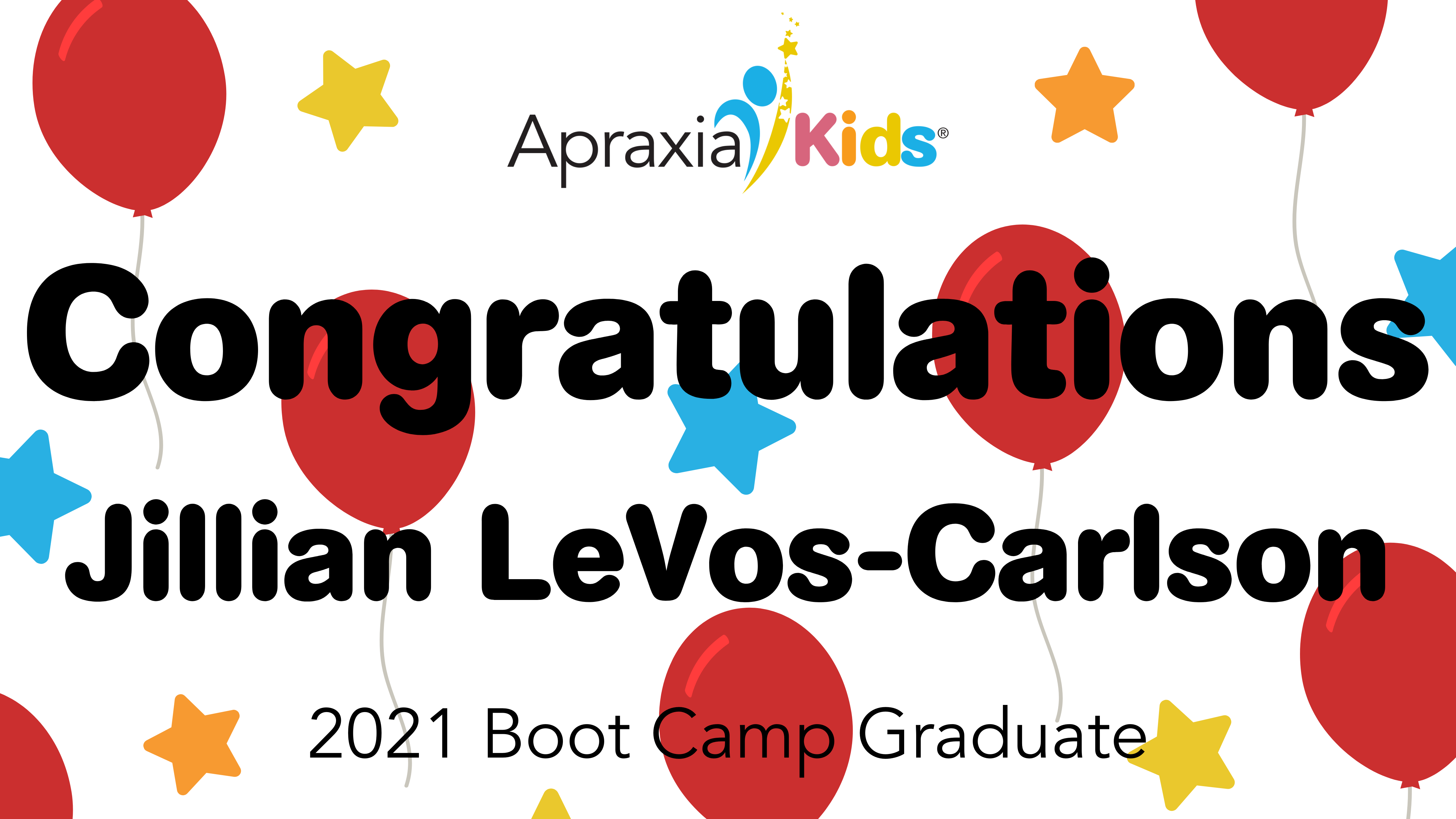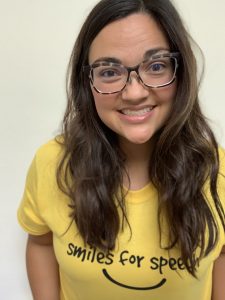
03 Jun CONGRATULATIONS JILLIAN LEVOS-CARLSON, MS, CCC-SLP!

Congratulations to Jillian LeVos-Carlson, MS, CCC-SLP, for graduating from the Apraxia Kids Intensive Training Institute (Apraxia Boot Camp)!
Jillian LeVos-Carlson specializes in Speech Sound Disorders. She holds a master’s degree from Loma Linda University in Communicative Sciences and Disorders. Jillian has worked in private practice and schools for the past fifteen years. In the last year, she started a boutique private practice in the Bay Area, CA specializing in Speech Sound Disorders. In addition, she also assists SLPs in the schools by providing assessment, therapy, and workshop support through Communication Works located in Lafayette, CA. Jillian is passionate about teaching and serving families with a variety of Speech Sound Disorders, especially Childhood Apraxia of Speech.
Jillian offers services in Bay Area, California.
Apraxia Kids: What are the top 3 things you learned from this training experience?
Jillian: Apraxia Boot Camp changed the way I looked at the assessment and treatment process for a child with a diagnosis of CAS. When making a differential diagnosis of CAS, we were taught that it is important to look at the “whole child” (i.e., their phonetic/phonemic inventories, family support system, considerations of verbal output, education level, etc.). Our mentors challenged us to look beyond just administering an articulation test and using a framework (i.e., dynamic motor speech assessment) to help guide us in order to make a confident differential diagnosis of CAS. Another essential element to the assessment and treatment of CAS that was taught in boot camp, was the importance of target selection and applying the Principles of Motor Learning. We were taught to look beyond the child’s phonetic and phonemic inventories and to think about the organicity, functionality, proprioceptive and sensorimotor factors that play an integral part into our therapeutic interventions. The final thing (but there is definitely a lot more I learned then just these highlights!) I learned in boot camp was the importance of educating other SLPs and families on the importance of incorporating Evidence Based Proven (EBP) therapeutic interventions, such as DTTC, ReST, Speech Motor Chaining, PROMPT, etc. into CAS therapy and using these interventions in relation to the Principles of Motor Learning.
Apraxia Kids: How did the boot camp experience change or expand your network of colleagues/friends?
Jillian: Boot camp was the best experience I have ever completed! I formed amazing bonds with my small group (the red group), our whole class, and especially my mentors, Dr. Julie Case and Sue Caspari, and our other mentors. I still keep in touch with my mentor and classmates, we are constantly learning from each other, and we still meet regularly to discuss journal articles or just go over therapy ideas. Since graduating from boot camp, I have had many “word of mouth” referrals come my way. It has been such a blessing getting to know new clients and their families and being a part of their Apraxia journey. Also gaining friendships both professionally and personally is amazing, and I can’t wait to see everyone at different Apraxia Conferences or even ASHA!
Apraxia Kids: How have you implemented the knowledge you gained at boot camp?
Jillian: Even while taking part in the first part of the boot camp experience, “journal club,” I was already implementing suggestions or ideas right away. I never realized how many resources are embedded for SLPs within a journal article. Also, all the feedback that I received from my mentor on my case study challenged me continually to relook at how I am assessing and writing reports for my CAS patients. Dr. Case continually challenged me to read the research and to not be afraid to ask questions. I have now made it my personal goal to read and implement some nugget of information from one journal article each month. (I also like to go back and re-read journal articles that we studied from boot camp.) This way I stay up on the latest research and make sure that I am being the best SLP that I can be for my patients and their families.
Apraxia Kids: What is an example of how you have been able to (or plan to) use your expertise as a local resource/support for other professionals and/or families since attending the intensive training?
Jillian: I have already been able to help other SLPs in surrounding school districts with assisting them in their assessment and treatment of CAS cases. I have also attended IEPs for families as a support to both them and the school to help guide goal writing and even provide consultation to the school SLP. Each day I try and do one thing that helps to give back to the community, whether it’s taking a few extra moments to answer a parent or SLP’s question, watching CEUs related to CAS, asking other SLP who specializes in speech sound disorders questions, etc. My ultimate dream is to teach a course on speech sound disorders and childhood apraxia of speech at the university level.
Apraxia Kids: What would you say to someone considering applying to boot camp next round?
Jillian: Apply! Boot camp was such an amazing opportunity, however, it does not stop there. Whether you apply to boot camp or not, take the time and learn more about EBP practices related to CAS, how to do conduct a dynamic motor speech assessment, research related to CAS, etc. Knowledge is power and it is the best gift we can give to our patients and their families.

Congratulations to Jillian LeVos-Carlson, MS, CCC-SLP, for graduating from the Apraxia Kids Intensive Training Institute (Apraxia Boot Camp)!
Jillian LeVos-Carlson specializes in Speech Sound Disorders. She holds a master’s degree from Loma Linda University in Communicative Sciences and Disorders. Jillian has worked in private practice and schools for the past fifteen years. In the last year, she started a boutique private practice in the Bay Area, CA specializing in Speech Sound Disorders. In addition, she also assists SLPs in the schools by providing assessment, therapy, and workshop support through Communication Works located in Lafayette, CA. Jillian is passionate about teaching and serving families with a variety of Speech Sound Disorders, especially Childhood Apraxia of Speech.
Jillian offers services in Bay Area, California.
Apraxia Kids: What are the top 3 things you learned from this training experience?
Jillian: Apraxia Boot Camp changed the way I looked at the assessment and treatment process for a child with a diagnosis of CAS. When making a differential diagnosis of CAS, we were taught that it is important to look at the “whole child” (i.e., their phonetic/phonemic inventories, family support system, considerations of verbal output, education level, etc.). Our mentors challenged us to look beyond just administering an articulation test and using a framework (i.e., dynamic motor speech assessment) to help guide us in order to make a confident differential diagnosis of CAS. Another essential element to the assessment and treatment of CAS that was taught in boot camp, was the importance of target selection and applying the Principles of Motor Learning. We were taught to look beyond the child’s phonetic and phonemic inventories and to think about the organicity, functionality, proprioceptive and sensorimotor factors that play an integral part into our therapeutic interventions. The final thing (but there is definitely a lot more I learned then just these highlights!) I learned in boot camp was the importance of educating other SLPs and families on the importance of incorporating Evidence Based Proven (EBP) therapeutic interventions, such as DTTC, ReST, Speech Motor Chaining, PROMPT, etc. into CAS therapy and using these interventions in relation to the Principles of Motor Learning.
Apraxia Kids: How did the boot camp experience change or expand your network of colleagues/friends?
Jillian: Boot camp was the best experience I have ever completed! I formed amazing bonds with my small group (the red group), our whole class, and especially my mentors, Dr. Julie Case and Sue Caspari, and our other mentors. I still keep in touch with my mentor and classmates, we are constantly learning from each other, and we still meet regularly to discuss journal articles or just go over therapy ideas. Since graduating from boot camp, I have had many “word of mouth” referrals come my way. It has been such a blessing getting to know new clients and their families and being a part of their Apraxia journey. Also gaining friendships both professionally and personally is amazing, and I can’t wait to see everyone at different Apraxia Conferences or even ASHA!
Apraxia Kids: How have you implemented the knowledge you gained at boot camp?
Jillian: Even while taking part in the first part of the boot camp experience, “journal club,” I was already implementing suggestions or ideas right away. I never realized how many resources are embedded for SLPs within a journal article. Also, all the feedback that I received from my mentor on my case study challenged me continually to relook at how I am assessing and writing reports for my CAS patients. Dr. Case continually challenged me to read the research and to not be afraid to ask questions. I have now made it my personal goal to read and implement some nugget of information from one journal article each month. (I also like to go back and re-read journal articles that we studied from boot camp.) This way I stay up on the latest research and make sure that I am being the best SLP that I can be for my patients and their families.
Apraxia Kids: What is an example of how you have been able to (or plan to) use your expertise as a local resource/support for other professionals and/or families since attending the intensive training?
Jillian: I have already been able to help other SLPs in surrounding school districts with assisting them in their assessment and treatment of CAS cases. I have also attended IEPs for families as a support to both them and the school to help guide goal writing and even provide consultation to the school SLP. Each day I try and do one thing that helps to give back to the community, whether it’s taking a few extra moments to answer a parent or SLP’s question, watching CEUs related to CAS, asking other SLP who specializes in speech sound disorders questions, etc. My ultimate dream is to teach a course on speech sound disorders and childhood apraxia of speech at the university level.
Apraxia Kids: What would you say to someone considering applying to boot camp next round?
Jillian: Apply! Boot camp was such an amazing opportunity, however, it does not stop there. Whether you apply to boot camp or not, take the time and learn more about EBP practices related to CAS, how to do conduct a dynamic motor speech assessment, research related to CAS, etc. Knowledge is power and it is the best gift we can give to our patients and their families.
Credentials:
Hours of Operation:
Treatment locations:
Address:
,
Phone:
Email:
Overall Treatment Approach:
Percent of CAS cases:
Parent Involvement:
Community Involvement:
Professional consultation/collaboration:
Min Age Treated:
Max Age Treated:
Insurance Accepted:




